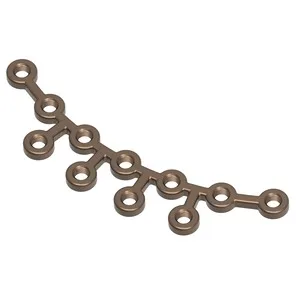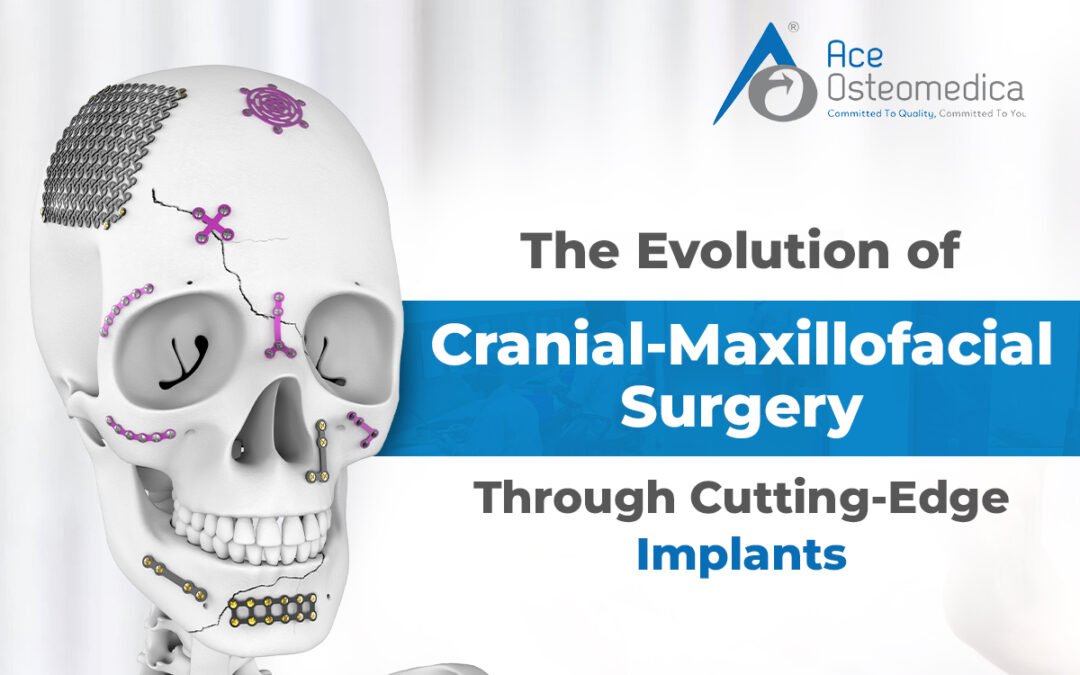Cranial-maxillofacial implants have undergone many significant advancements. These implants play a very important role in the restoration of facial bone structure, functionally, and aesthetics after trauma, congenital deformities, or tumor resections. The demand for precise, durable, and biocompatible implants has grown immensely as surgical techniques have evolved.
Ace Osteomedica, a leading orthopedic implant manufacturer based in India is not only working on the growing demands of the domestic healthcare sector but has also established a great presence internationally, mostly in countries like Guatemala, Kenya, Peru, and Ecuador.
What are Cranial-Maxillofacial Implants?
Cranial-Maxillofacial implants are made to support or replace the bones of the face and skull. These implants are used in numerous clinical scenarios, such as:
- Trauma Reconstruction (e.g., fractures from accidents)
- Congenital Deformities (e.g., craniosynostosis)
- Post-tumor resection repairs
- Reconstructive surgeries following infections or injuries
- Aesthetic enhancements and facial symmetry corrections
Restoring normal anatomical structure, protecting vital organs (like the brain and eyes), and enhancing the patient’s quality of life, are some of the primary goals of these implants. Commonly used materials for these implants include titanium, PEEK (polyether ether ketone), and bioresorbable polymers. All these materials are used because of their strength, biocompatibility, and customization capabilities.
What is the need for Cranial-Maxillofacial Implants?

The protection, function, and appearance of any anatomy is backed up by the skull and facial bones. Any damage or injury to this region may result in trauma to the whole body including the mind. Some of the reasons why the right choice of implants is essential:
- Functional Restoration – Implants help restore necessary functions like chewing, speaking, and vision alignment.
- Aesthetic Recovery – Aesthetics are essential for psychological health, especially in the cases of facial injuries.
- Safety and Protection – In cases of skull defects, cranial implants protect the brain.
- Durability and Biocompatibility – Implants have to blend well with bone tissue and last long without causing immune reactions.
Read More – Understanding the Orthopedic Implant Manufacturing Process
The Future of Cranial-Maxillofacial Implants in Orthopedic Implant Manufacturing
Implants that are customized specifically for the patient’s anatomy are essential to modern cranial-maxillofacial operations. Orthopedic implant manufacturer companies like Ace Osteomedica create patient-specific implants (PSIs) that offer enhanced fitting, shorter healing times, and reduced operating times. Ace Osteomedica provides a variety of customized solutions, such as:
- Titanium Cranial Plates for skull reconstruction.
- Zygomatic and Orbital Meshes for mid-face fractures.
- Mandibular Reconstruction Plates for jaw defects.
- Resorbable Fixation Systems for pediatric and minor trauma cases.
The ability to design these implants quickly and affordably gives the company an advantage in both domestic and international markets. Each implant undergoes rigorous quality checks, making Ace Osteomedica a reputed and reliable orthopedic implant manufacturer as the company stems from its mechanical testing, biocompatibility assessments, sterilization validation, radiographic compatibility, and strict adherence to global quality standards.
The Role of Ace Osteomedica in Cranial-Maxillofacial Implant Manufacturing

Ace Osteomedica, a leading orthopedic implant manufacturer has built a trust in the global medical device industry. The company is known for its quality engineering, innovative designs, and commitment to quality making it specialized in orthopedic and craniofacial solutions. Key strengths of Ace Osteomedica:
- Cutting-edge manufacturing facilities following international standards like ISO 13485 and CE certification.
- For designing patient-specific implants (PSIs), advanced R&D capabilities are there.
- Use of high-grade materials such as titanium alloys and medical-grade polymers.
- Strong global supply chain which ensures timely deliveries in countries across Asia, Africa, and Latin America.
The company is contributing to improved healthcare outcomes in regions like Guatemala, Kenya, Pery, Colombia, and Ecuador having very limited access to specialized surgical implants by supplying implants like cranial-maxillofacial implants. Ace Osteomedica’s presence in these regions ensures the timely availability of high-quality implants, customized complex implants according to the patient’s choice, and effective reconstructive care. The regions with a growing focus on improving healthcare infrastructure have resulted in increased demand for advanced orthopedic and cranial solutions.
Conclusion
The growing need for cranial-maxillofacial implants has undergone many significant advancements. Cranial-Maxillofacial implants which are made to support or replace the bones of the face and skull have seen a great demand for precise, durable, and biocompatible implants. The regions with a growing focus on improving healthcare infrastructure have resulted in increased demand for advanced orthopedic and cranial solutions. Ace Osteomedic has built trust in the global medical device industry.
Ace Osteomedica is a reputed and reliable orthopedic implant manufacturer, as the company stems from its mechanical testing, biocompatibility assessments, sterilization validation, radiographic compatibility, and strict adherence to global quality standards. The company provides a variety of customized solutions such as – Titanium Cranial Plates for skull reconstruction, Mandibular Reconstruction Plates for jaw defects, and advanced R&D capabilities.
The company is contributing to improved healthcare outcomes in regions like Guatemala, Kenya, Pery, Colombia, and Ecuador having very limited access to specialized surgical implants by supplying implants like cranial-maxillofacial implants. Ace Osteomedica combines innovation, accessibility, and compassion in every implant providing hope as global healthcare systems are striving for more inclusive and advanced surgical solutions.

